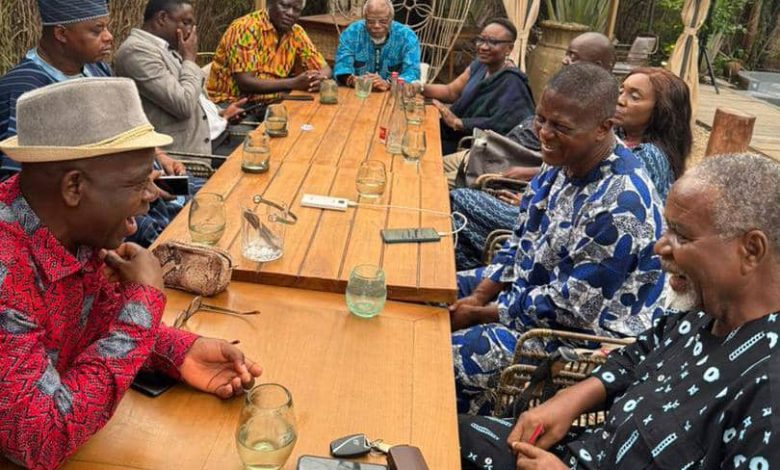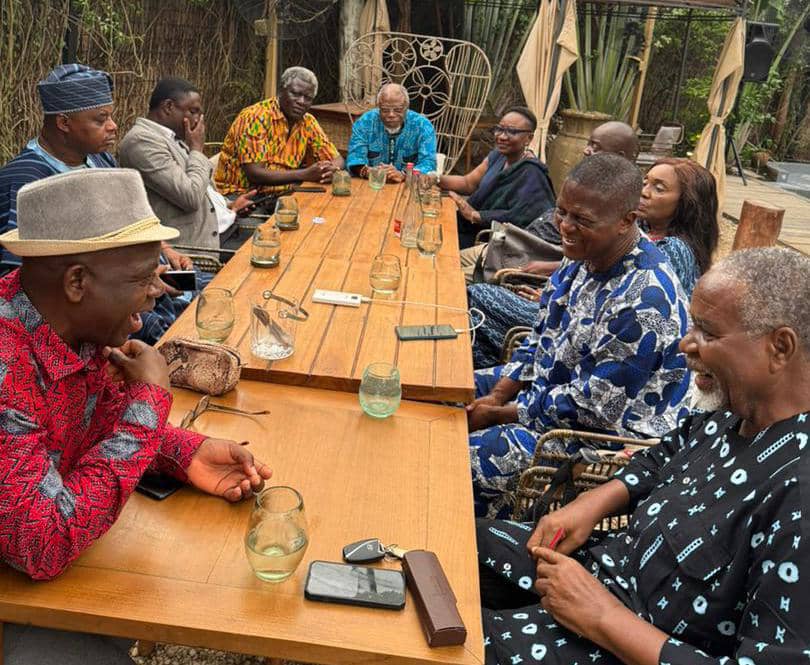
Dinner was served just as twilight descended on the sunny Accra skyline. We were sitting outside a restaurant somewhere in the Labone area of Accra, Ghana with its beautiful ambience next to the DJ who pelted out loud melodic African music from a loudspeaker. As we enjoyed the fresh Jasmine-scented evening breeze, our host, Professor Toyin Falola, historian, prolific author and essayist made his entry.
While Falola ordered for Green soup (Ebunu Ebunu) a Ghanaian culinary delight made from cocoyam leaves (Kontomire), I chose Jollof rice with lamb chops. The chops were succulent and well garnished. Although spicy and crisp, the Jollof rice was a few notches below the one I ate a few years ago in Senegal, considered by many as the real home of the internationally acclaimed cuisine.
As it happens in history, when an art reaches a certain fame or notoriety, its paternity becomes an object of controversy. This is what has indeed happened with Jollof rice which was named after the Wolof people of the Wolof Empire, which once spanned parts of modern-day Senegal, The Gambia, and Mauritania.
Toyin Omoyeni Falola is a Nigerian historian and Professor of African Studies. A Fellow of the Historical Society of Nigeria and of the Nigerian Academy of Letters, and a past President of the African Studies Association, Falola is currently the Jacob and Frances Sanger Mossiker Chair in the Humanities at the University of Texas at Austin, USA. His contributions to the literary world are unparalleled, reflecting a unique blend of creativity, advocacy, leadership, and cultural pride. His ability to inspire and mentor fellow academics, promote international cultural diplomacy and engage with diverse audiences showcases his profound impact on the African and international literary landscape.
 Out of his numerous nicknames besotted on him by his army of admirers, colleagues and legatees, my favourite is ‘Iwin’ the Yoruba word for someone whose impressive performance is beyond imagination.
Out of his numerous nicknames besotted on him by his army of admirers, colleagues and legatees, my favourite is ‘Iwin’ the Yoruba word for someone whose impressive performance is beyond imagination.
In Ghana recently for a three- leg lecture circuit, Prof Falola had invited some of his friends, colleagues, students and mentees to dinner. That was how my wife and I found ourselves in the midst of a distinguished group of Falola’s guests.
Leading the pack was the iconic Ghanaian poet and scholar, Prof Kofi Anyindoho, Others were; Prof Samuel Nte Owusu, Prof Laja Odumosu, Prof James Akanmu, Prof Edmund Abakah, Dr Martin Egblewogbe, Dr Michael Ampofo, Dr Chika Mba, and Dr Kemi Wale-Olaitan.
Dinner over, the evening shifted to a lively discussion over drinks and some highly exotic lubricants. After allowing his guests to speak, Prof Falola went on a memory lane.
He regaled us with some interesting aspects of his childhood. One of them was in relation to his remarkable academic performance as a young student, which made his family to accuse him of having ‘stolen’ the brains of his other siblings. The ‘punishment’ for this ‘demeanour’ was the family’s decision that he must share some of his salaries with his other less endowed siblings.
Prof Falola who has been teaching at the University of Texas at Austin since 1991, also believes that African scholars should not be apologetic about working in foreign countries since according to him, the white men in the guise of colonization were the first to invade African continent centuries ago.
Regarding the important issue of fund raising for African Universities and Intellectual activities, Prof Falola is of the opinion that some alumni of African Universities who have now become international stars especially in the music and film industries can assist in this onerous task. However, before this can be done, our Universities have to adopt a ‘student-friendly’ attitude towards their students if we want the same students to be responsive to the University demands for support when they become successful alumni.
It is on record that ‘Writers Block’ has tormented writers and scholars for ages. Writers who could not handle this frustrating literary affliction, usually sought help from chemical inspirations such as coffee, alcohol and oftentimes, something harder.
However, as far as Professor Toyin Falola is concerned, there is no writers block in his dictionary.
With more than 100 thought-provoking books and articles focused on the African experience under his belt, the free- wheeling literary savant’s insatiable desire to write (Cacoethes Scribendi) is a great ‘non chemical’ inspiration for writers with writer’s block.
‘’I don’t sleep much. All I want to do is to write all the time’’ confessed the intellectual polymath. An insomniac is someone who has trouble falling asleep, staying asleep, or both. They may also wake up too early and not be able to get back to sleep.
This condition is known as insomnia. A combination of Cacoethes Scribendi and insomnia with a generous dose of brain matter as found in Falola can only produce an Intellectual Ballistic Missile (IBM) whose mission is to break down intellectual and sectional barriers.
Prof Falola’s readiness to serve is evident in his approachability and the respect he garners from colleagues and subordinates alike. His mentorship style is characterised by an inclusive approach, fostering a collaborative environment where everyone he works with feels valued and motivated. His commitment to mentoring and empowering others underscores his dedication to nurturing the next generation of African intellectuals.
A regular collaborator with the Pan African Writers Association (PAWA) of which I am the current Secretary General, Prof Falola has assisted in unifying African writers by hosting workshops and literary webinars. His diverse areas of discipline range from African studies, history to governance, development and politics, and from literature to education to the study of religion.
In addition, Falola has inaugurated a new academic field, ‘African Ancestral Studies’ which aims to integrate various disciplines and create holistic bodies of knowledge by foregrounding endogenous African knowledge systems.
As waiters finally cleared our tables of empty plates and cups, we took leave of our eminent host just as dusk descended on the Accra, skyline.
And as he reeled out his usually loaded forthcoming itinerary that ranged from lectures and workshops from South Africa to Nigeria, and Kenya among other countries, Toyin Falola eyes glistened with unabashed excitement at the copious intellectual feast awaiting his attention.




